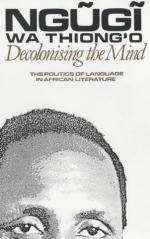
|
| Name: _________________________ | Period: ___________________ |
This quiz consists of 5 multiple choice and 5 short answer questions through Chapter 1 (Parts VI-IX): "The Language of African Literature" .
Multiple Choice Questions
1. The author poses the question in Chapter 1, Part VIII, "What is the difference between a politician who says Africa cannot do without imperialism and the writer who says Africa cannot do without" what (26)?
(a) "European culture."
(b) "Western philosophies."
(c) "European languages."
(d) "Western ideologies."
2. When did Ngũgĩ wa Thiong’o begin writing in Gĩkũyũ?
(a) 1977.
(b) 1975.
(c) 1982.
(d) 1973.
3. What statement largely sums up the author's central theme in Chapter 1, Part IV?
(a) Communication creates culture, and culture is a means of communication.
(b) Culture reflects history and communication carries history.
(c) Culture creates communication, and communication is a means to culture.
(d) Culture and communication are unnecessary.
4. The author states in Chapter 1, Part IV, "Language as culture is the collective memory bank of a people's" what (15)?
(a) "Family and bloodline."
(b) "Suffering and domination."
(c) "Experience in history."
(d) "Perceptions of outsiders."
5. Where did the capitalist powers of Europe carve up the continent of Africa into different colonies in the late 1800s?
(a) London.
(b) Berlin.
(c) Paris.
(d) Amsterdam.
Short Answer Questions
1. What were largely featured as the main characters in the stories that Ngũgĩ wa Thiong’o grew up listening to as a child?
2. Who wrote the African novel The Voice?
3. What does the author say the real aim of colonialism was in Chapter 1, Part V?
4. What does the word "axiomatic" mean, as used in Chapter 1, Part I?
5. Whose perceptions of Africa does the author described in Chapter 1, Part V as "comparable to a land of childhood still enveloped in the dark mantle of the night as far as the development of self-conscious history was concerned" (18)?
|
This section contains 298 words (approx. 1 page at 300 words per page) |

|




